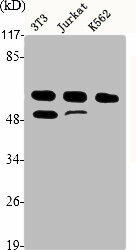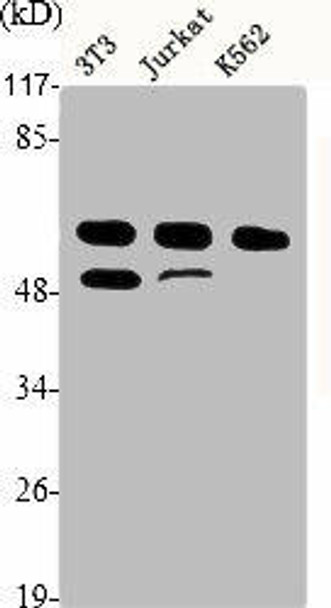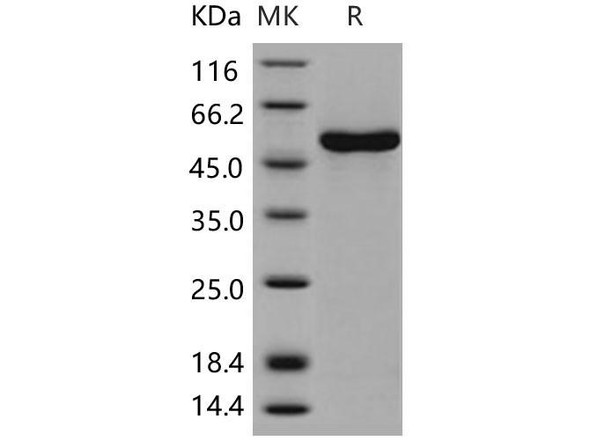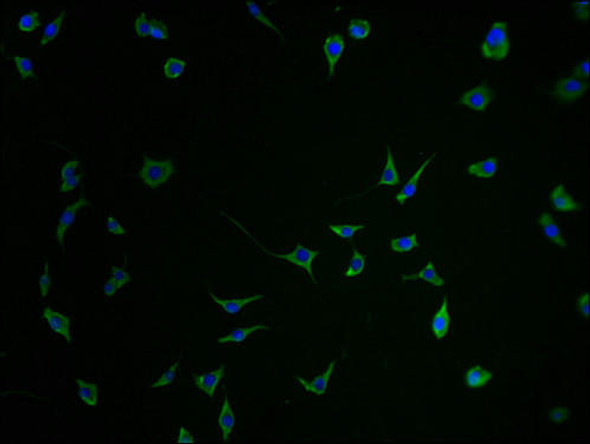Description
CCNA1/CCNA2 Antibody (PACO06389)
The CCNA1/CCNA2 Antibody (PACO06389) is a valuable tool for researchers studying the CCNA1 and CCNA2 proteins, which play crucial roles in cell cycle regulation and reproduction. This polyclonal antibody, produced in rabbits, is highly specific and reacts strongly with human samples, making it ideal for a variety of experimental applications. The CCNA1/CCNA2 Antibody has been validated for use in Western blotting, immunohistochemistry, and immunofluorescence, enabling researchers to detect and analyze the expression and localization of CCNA1 and CCNA2 in different cell types and tissues. This antibody's versatility makes it a valuable asset for research in fields such as cell biology, developmental biology, and reproductive medicine.
Understanding the functions and regulation of CCNA1 and CCNA2 is essential for unraveling the complexities of cell cycle control and reproduction. Dysregulation of these proteins has been implicated in various diseases, including cancer and fertility disorders, making them potential targets for therapeutic interventions. By utilizing the CCNA1/CCNA2 Antibody, researchers can gain valuable insights into the roles of these proteins in health and disease, paving the way for innovative treatments and interventions.
| Antibody Name: | CCNA1/CCNA2 Antibody (PACO06389) |
| Antibody SKU: | PACO06389 |
| Size: | 50ug |
| Host Species: | Rabbit |
| Tested Applications: | ELISA, WB, IHC, IF |
| Recommended Dilutions: | ELISA:1:10000, WB:1:500-1:2000, IHC:1:100-1:300, IF:1:200-1:1000 |
| Species Reactivity: | Human, Mouse, Rat, Monkey |
| Immunogen: | Synthesized peptide derived from the Internal region of human Cyclin A. |
| Form: | Liquid |
| Storage Buffer: | Liquid in PBS containing 50% glycerol, 0.5% BSA and 0.02% sodium azide. |
| Purification Method: | The antibody was affinity-purified from rabbit antiserum by affinity-chromatography using epitope-specific immunogen. |
| Clonality: | Polyclonal |
| Isotype: | IgG |
| Conjugate: | Non-conjugated |
 | Western Blot analysis of NIH-3T3 Jurkat K562 cells using Cyclin A Polyclonal Antibody. |
 | Western Blot analysis of COS7 cells using Cyclin A Polyclonal Antibody. |
| Synonyms: | CCNA1; Cyclin-A1; CCNA2; CCN1; CCNA; Cyclin-A2; Cyclin-A |
| UniProt Protein Function: | CCNA1: May be involved in the control of the cell cycle at the G1/S (start) and G2/M (mitosis) transitions. May primarily function in the control of the germline meiotic cell cycle and additionally in the control of mitotic cell cycle in some somatic cells. Belongs to the cyclin family. Cyclin AB subfamily. 3 isoforms of the human protein are produced by alternative splicing. |
| UniProt Protein Details: | Protein type:Cancer Testis Antigen (CTA); Cell cycle regulation; Nuclear receptor co-regulator Chromosomal Location of Human Ortholog: 13q12.3-q13 Cellular Component: nucleoplasm; microtubule cytoskeleton; cytosol Molecular Function:protein binding; protein kinase binding Biological Process: G1/S-specific transcription in mitotic cell cycle; mitosis; male meiosis I; cell division; regulation of G2/M transition of mitotic cell cycle; spermatogenesis; regulation of cyclin-dependent protein kinase activity; mitotic cell cycle; G2/M transition of mitotic cell cycle; G1/S transition of mitotic cell cycle |
| NCBI Summary: | The protein encoded by this gene belongs to the highly conserved cyclin family, whose members are characterized by a dramatic periodicity in protein abundance through the cell cycle. Cyclins function as regulators of CDK kinases. Different cyclins exhibit distinct expression and degradation patterns which contribute to the temporal coordination of each mitotic event. The cyclin encoded by this gene was shown to be expressed in testis and brain, as well as in several leukemic cell lines, and is thought to primarily function in the control of the germline meiotic cell cycle. This cyclin binds both CDK2 and CDC2 kinases, which give two distinct kinase activities, one appearing in S phase, the other in G2, and thus regulate separate functions in cell cycle. This cyclin was found to bind to important cell cycle regulators, such as Rb family proteins, transcription factor E2F-1, and the p21 family proteins. Multiple transcript variants encoding different isoforms have been found for this gene. [provided by RefSeq, Jul 2008] |
| UniProt Code: | P78396 |
| NCBI GenInfo Identifier: | 8134359 |
| NCBI Gene ID: | 8900 |
| NCBI Accession: | P78396.1 |
| UniProt Secondary Accession: | P78396,Q5T3V0, Q5U0G2, Q8IY91, B7Z7E3, |
| UniProt Related Accession: | P78396 |
| Molecular Weight: | 465 |
| NCBI Full Name: | Cyclin-A1 |
| NCBI Synonym Full Names: | cyclin A1 |
| NCBI Official Symbol: | CCNA1 |
| NCBI Official Synonym Symbols: | CT146 |
| NCBI Protein Information: | cyclin-A1 |
| UniProt Protein Name: | Cyclin-A1 |
| Protein Family: | Cyclin |
| UniProt Gene Name: | CCNA1 |
| UniProt Entry Name: | CCNA1_HUMAN |











